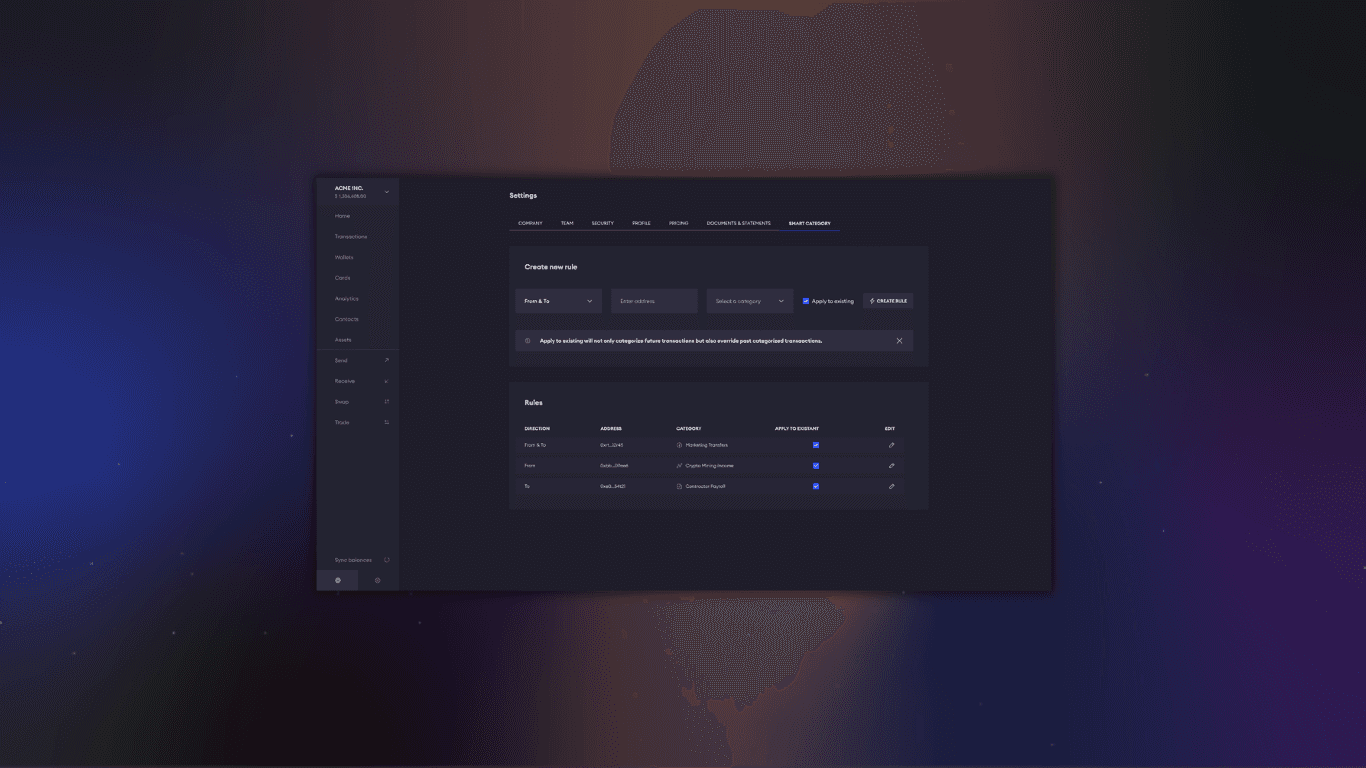Category labels and contact book: the details that make a difference


Building a crypto wallet for business: the little details count
At Multis, we’re striving to build the best crypto wallet for DAOs and crypto companies. This means features like ETH/BTC compatibility, the ability to make bulk payments, Euro and Dollar accounts, and setting up payment workflows for a company. Our engineering team has their hands full (which is why we have expanded our team we and are still hiring) — this is a tall order.
But technically ambitious features aren’t the only way to ensure that companies can get a grip on their crypto operations. We know from lived experience (and hours spent on accounting) that small details can go a long way in saving time and money. It’s why we’ve paid special attention to labelling and to building an address book.
Category labels: Key to accounting clarity
Crypto native companies can make dozens, if not hundreds of blockchain transactions a day. Failure to note the purpose of the transaction and to categorize the expense as soon as it occurs can result in hours spent doing quarterly reconciliation (in the beginning our CEO Thibaut would spend 10 hours processing one month’s worth of transactions).
Our Multis accounts have always incorporated a labelling function in order to make expense reporting easier. In our soon-to-be-released wallet, companies will have over a dozen expense category options to choose from and the ability to create their own labels for specific expenses. We’re also working on an automatic labelling feature, which would ensure that recurring expenses (like payroll) get labeled instantaneously as a transaction is made.
Contact Book: For making fast and easy payments
As anyone in crypto knows, paying someone can be at times a scary process. Manually entering a long wallet address requires careful attention, double checking, and being sure that you’re copy-pasting the right address as crypto transactions are irreversible. While stories about hopeless users accidentally sending thousands (sometimes millions) in crypto to the wrong wallet are funny to hear about, even experienced people in crypto can make these errors.

This is why one of our key features is a contact book where users save (and update) addresses of frequent counterparties. This makes paying people easy and fast and a lot safer than copy-pasting wallet addresses from a google sheet. Not only is it easier to pay these wallets, but it also adds clarity to reporting. An accountant or office manager doesn’t need to translate data in etherscan but can visualize it on their dashboard and export the data as a .csv.
While expenses labelling and an address book might not be the sexiest thing happening in crypto right now, we think these features are necessary to mainstreaming digital assets and blockchain technology for businesses and taking the angst out of using them.
Building a crypto wallet for business: the little details count
At Multis, we’re striving to build the best crypto wallet for DAOs and crypto companies. This means features like ETH/BTC compatibility, the ability to make bulk payments, Euro and Dollar accounts, and setting up payment workflows for a company. Our engineering team has their hands full (which is why we have expanded our team we and are still hiring) — this is a tall order.
But technically ambitious features aren’t the only way to ensure that companies can get a grip on their crypto operations. We know from lived experience (and hours spent on accounting) that small details can go a long way in saving time and money. It’s why we’ve paid special attention to labelling and to building an address book.
Category labels: Key to accounting clarity
Crypto native companies can make dozens, if not hundreds of blockchain transactions a day. Failure to note the purpose of the transaction and to categorize the expense as soon as it occurs can result in hours spent doing quarterly reconciliation (in the beginning our CEO Thibaut would spend 10 hours processing one month’s worth of transactions).
Our Multis accounts have always incorporated a labelling function in order to make expense reporting easier. In our soon-to-be-released wallet, companies will have over a dozen expense category options to choose from and the ability to create their own labels for specific expenses. We’re also working on an automatic labelling feature, which would ensure that recurring expenses (like payroll) get labeled instantaneously as a transaction is made.
Contact Book: For making fast and easy payments
As anyone in crypto knows, paying someone can be at times a scary process. Manually entering a long wallet address requires careful attention, double checking, and being sure that you’re copy-pasting the right address as crypto transactions are irreversible. While stories about hopeless users accidentally sending thousands (sometimes millions) in crypto to the wrong wallet are funny to hear about, even experienced people in crypto can make these errors.

This is why one of our key features is a contact book where users save (and update) addresses of frequent counterparties. This makes paying people easy and fast and a lot safer than copy-pasting wallet addresses from a google sheet. Not only is it easier to pay these wallets, but it also adds clarity to reporting. An accountant or office manager doesn’t need to translate data in etherscan but can visualize it on their dashboard and export the data as a .csv.
While expenses labelling and an address book might not be the sexiest thing happening in crypto right now, we think these features are necessary to mainstreaming digital assets and blockchain technology for businesses and taking the angst out of using them.